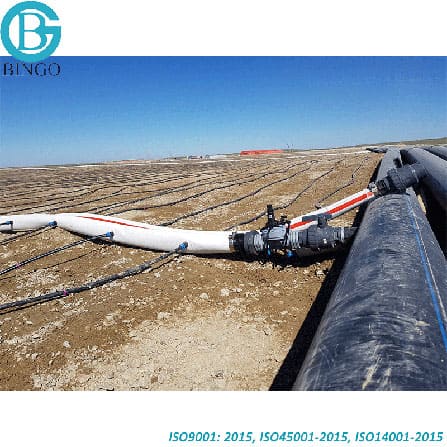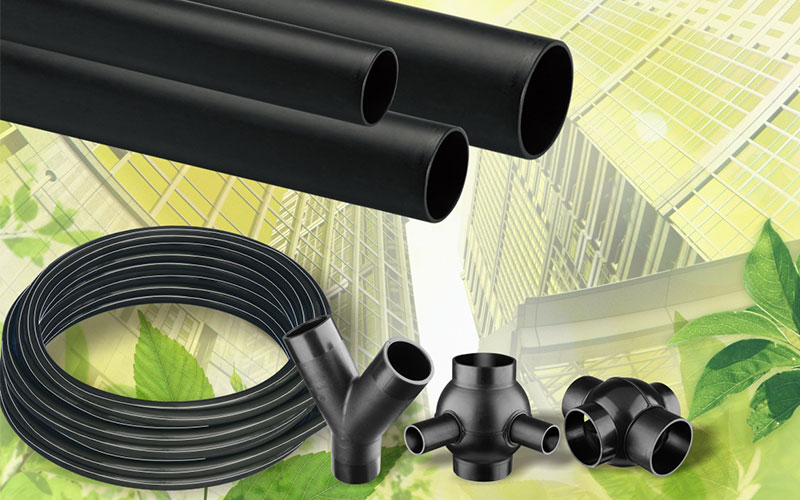Recognizing the Trick Benefits of HDPE Pipe for Water and Wastewater Administration
Using HDPE pipe in water and wastewater management presents various advantages that merit factor to consider. Its remarkable longevity and lengthy lifespan make it a favored selection for lots of projects. In addition, the product's resistance to deterioration and chemical damage improves its dependability in numerous atmospheres. The advantages extend past just long life and resistance. hdpe pipe fittings Midland TX. Discovering its cost-effectiveness and ecological effect discloses also extra engaging factors for its extensive fostering in modern facilities
Exceptional Toughness and Long Life

HDPE pipe stands apart for its remarkable longevity and longevity, making it a favored selection in water monitoring systems. Constructed from high-density polyethylene, these pipelines can hold up against considerable stress and anxiety, ensuring reliable performance with time. Their robust nature allows them to withstand extreme environmental problems, including temperature fluctuations and soil motions, which can cause other materials to fail.
The life-span of HDPE pipes frequently surpasses 50 years, giving a cost-effective service for districts and sectors alike. In addition, the product's lightweight residential properties streamline setup, minimizing labor costs and durations. This resilience lessens the demand for regular repair work or replacements, even more enhancing its economic allure.
In water management applications, the integrity of HDPE pipes means fewer disruptions and improved solution connection, making them essential to sustainable framework growth. The combination of sturdiness and long life strengthens HDPE's duty as a cornerstone in efficient water monitoring remedies.

Resistance to Deterioration and Chemical Damage
While several products catch corrosion and chemical damage gradually, HDPE pipelines show impressive resistance, making them optimal for various water monitoring applications. This strength comes from the molecular structure of high-density polyethylene, which is inherently non-reactive and does not rust like steels or degrade from direct exposure to harsh chemicals. Therefore, HDPE is very effective in environments with aggressive compounds, such as wastewater systems that may have acids, bases, and organic solvents.
Furthermore, HDPE pipes can endure environmental elements such as soil level of acidity and saline problems, additionally enhancing their suitability for diverse applications (Pipe Supplier American Plastics Midland). Their ability to keep structural honesty over time lowers the risk of leaks and failures, which is vital in guaranteeing the safety and security and reliability of water distribution and wastewater monitoring systems. The resistance to deterioration and chemical damage considerably contributes to the overall efficiency and longevity of HDPE piping solutions.
Cost-Effectiveness and Economic Benefits
When thinking about the economic ramifications of water administration systems, the cost-effectiveness of HDPE pipelines ends up being obvious. These pipes provide lower installation and upkeep prices compared to standard materials like steel or concrete. Their light-weight nature simplifies transport and setup, resulting in lowered labor expenses. Additionally, HDPE pipelines show a lengthy life-span, usually surpassing 50 years, which converts to fewer substitutes and long-term financial savings.
Additionally, the resistance of HDPE to corrosion and chemical damages minimizes the demand for costly repair work and replacements. The pipelines also sustain efficient water flow, decreasing energy prices connected with pumping systems. By alleviating leaks and water loss, HDPE pipes contribute to considerable economic advantages for towns and markets alike. Overall, the first investment in HDPE piping can yield substantial monetary returns over the life expectancy of the water administration system, making it a sensible option for lasting facilities development.
Ecological Sustainability and Minimized Effect

Convenience and Adaptability in Setup
As a result of their distinct residential or commercial properties, HDPE pipes use remarkable convenience and flexibility in setup, making them appropriate for a large range of applications. Their lightweight nature permits easier handling and transport, minimizing labor prices and installation time. HDPE pipelines can be bent and formed to fit numerous terrains and job needs, which is particularly helpful in challenging atmospheres.
In addition, their resistance to rust and chemical damages permits setup in varied setups without the demand for specialized protective coverings. The ability to fuse joints develops a constant, leak-free system, boosting the total stability and integrity of the installation. HDPE's flexibility also suits ground motion, reducing the risk of damages in areas prone to moving dirt. Overall, these attributes make HDPE pipelines not only versatile however additionally a favored option for water and wastewater administration systems.
Regularly Asked Questions
How Does HDPE Pipeline Contrast to PVC in Water Management Applications?
HDPE pipeline provides superior adaptability, resistance to rust, and resilience contrasted to PVC. Its lighter weight helps with less complicated installment, while its long life-span reduces replacement costs, making HDPE a recommended choice in water administration applications.
What Is the Life-span of HDPE Water Lines Under Common Problems?
Under regular problems, HDPE pipelines can have a life expectancy ranging from 50 to 100 years. Their durability and resistance to corrosion add to their lasting performance in different applications, making them a dependable choice for framework.
Are HDPE Pipeline Recyclable After Their Service Life?
Yes, HDPE pipelines are recyclable after their life span. American Plastics HDPE Pipe Manufacturing. They can be processed and repurposed into brand-new products, substantially minimizing environmental influence and advertising sustainability within the industry, making them a green option for piping remedies
What Is the Installation Refine for HDPE Piping?
The installation procedure for HDPE pipes includes site prep work, trenching, pipe combination or mechanical joining, backfilling, and stress testing. Correct methods guarantee a resilient and reliable system for carrying water and wastewater properly.
Can HDPE Piping Be Used for Both Drinkable and Non-Potable Water Systems?
Yes, HDPE pipes can be used for both drinkable and non-potable water systems. Their adaptability, longevity, and resistance to rust make them appropriate for various applications, making certain risk-free and effective transport of water in different contexts.